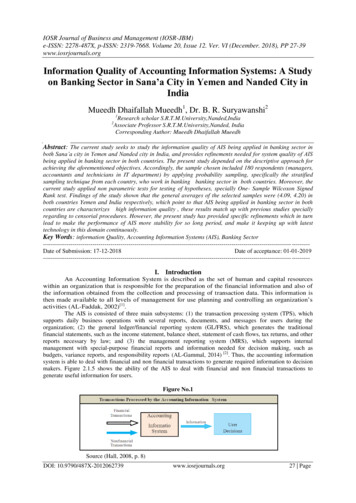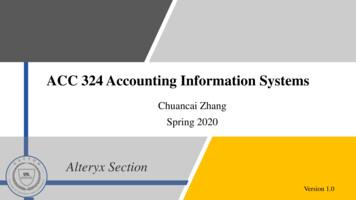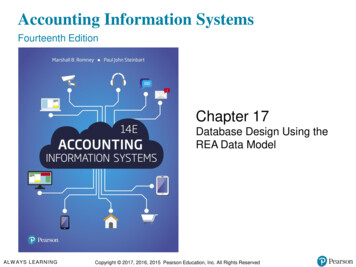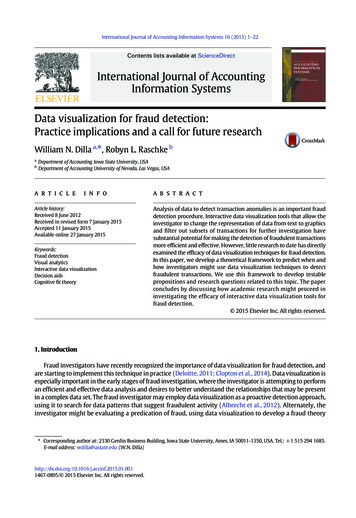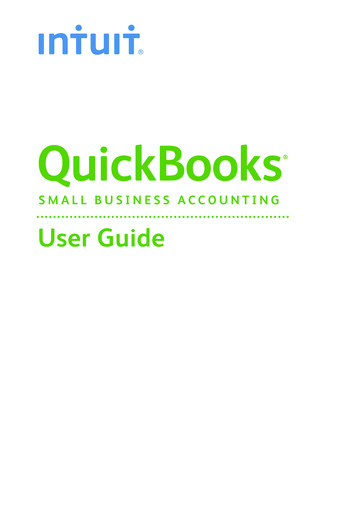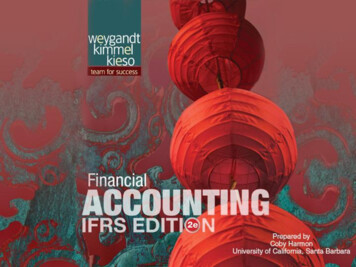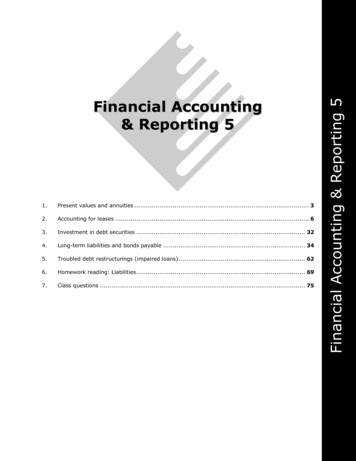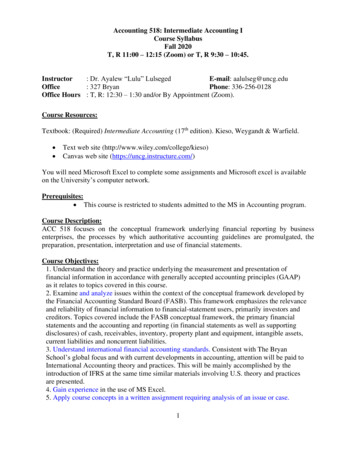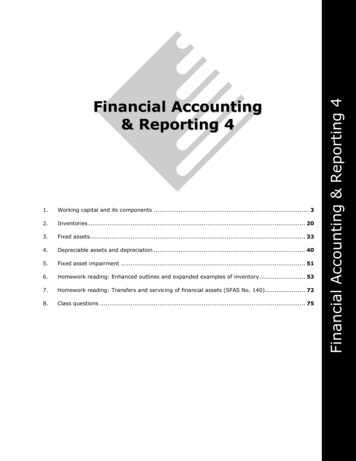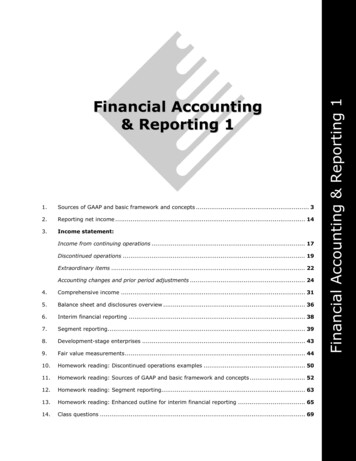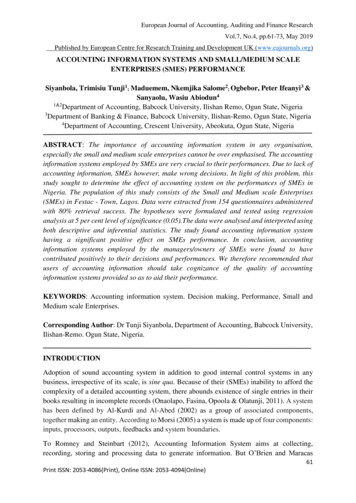
Transcription
European Journal of Accounting, Auditing and Finance ResearchVol.7, No.4, pp.61-73, May 2019Published by European Centre for Research Training and Development UK (www.eajournals.org)ACCOUNTING INFORMATION SYSTEMS AND SMALL/MEDIUM SCALEENTERPRISES (SMES) PERFORMANCESiyanbola, Trimisiu Tunji1; Maduemem, Nkemjika Salome2; Ogbebor, Peter Ifeanyi3 &Sanyaolu, Wasiu Abiodun41&2Department of Accounting, Babcock University, Ilishan Remo, Ogun State, Nigeria3Department of Banking & Finance, Babcock University, Ilishan-Remo, Ogun State, Nigeria4Department of Accounting, Crescent University, Abeokuta, Ogun State, NigeriaABSTRACT: The importance of accounting information system in any organisation,especially the small and medium scale enterprises cannot be over emphasised. The accountinginformation systems employed by SMEs are very crucial to their performances. Due to lack ofaccounting information, SMEs however, make wrong decisions. In light of this problem, thisstudy sought to determine the effect of accounting system on the performances of SMEs inNigeria. The population of this study consists of the Small and Medium scale Enterprises(SMEs) in Festac - Town, Lagos. Data were extracted from 154 questionnaires administeredwith 80% retrieval success. The hypotheses were formulated and tested using regressionanalysis at 5 per cent level of significance (0.05).The data were analysed and interpreted usingboth descriptive and inferential statistics. The study found accounting information systemhaving a significant positive effect on SMEs performance. In conclusion, accountinginformation systems employed by the managers/owners of SMEs were found to havecontributed positively to their decisions and performances. We therefore recommended thatusers of accounting information should take cognizance of the quality of accountinginformation systems provided so as to aid their performance.KEYWORDS: Accounting information system. Decision making, Performance, Small andMedium scale Enterprises.Corresponding Author: Dr Tunji Siyanbola, Department of Accounting, Babcock University,Ilishan-Remo. Ogun State, Nigeria.INTRODUCTIONAdoption of sound accounting system in addition to good internal control systems in anybusiness, irrespective of its scale, is sine qua. Because of their (SMEs) inability to afford thecomplexity of a detailed accounting system, there abounds existence of single entries in theirbooks resulting in incomplete records (Onaolapo, Fasina, Opoola & Olatunji, 2011). A systemhas been defined by Al-Kurdi and Al-Abed (2002) as a group of associated components,together making an entity. According to Morsi (2005) a system is made up of four components:inputs, processors, outputs, feedbacks and system boundaries.To Romney and Steinbart (2012), Accounting Information System aims at collecting,recording, storing and processing data to generate information. But O’Brien and Maracas61Print ISSN: 2053-4086(Print), Online ISSN: 2053-4094(Online)
European Journal of Accounting, Auditing and Finance ResearchVol.7, No.4, pp.61-73, May 2019Published by European Centre for Research Training and Development UK (www.eajournals.org)(2010) viewed it from high integration point of view when they linked it with daily businessprocesses of an organization to generate information. Sustano (2004) had also earlier viewed itfrom the same perspective when he posited that accounting system is an integration of subsystems, interconnected with each other to process data related to financial problem intofinancial information. To Abdallah (2013), a system does not exist on its own it must beinterconnected.There seems to be no uniformity in the definitions of Small and Medium scale Enterprises(SMEs) as the terms are relative, they differ from business to business and from one nation toanother (PricewaterhouseCoopers, 2009). ILO, (1997) also confirmed this assertion as theyposited that no single definition can capture all the dimensions of “micro”, “small”, “medium”or “large”. Nor can it expect to reflect the differences between firms, sectors or countries atdifferent levels of development. This assertion was also supported by Holt (2009).According to IFRS, Small and Medium Enterprises are entities without public accountability,as they are neither compelled to publish general purpose financial statements nor followgenerally accepted accounting principles (GAAP). The fact that financial statements preparedby these entities are normally laced with personal judgement of the owners, make the entitiesto be vulnerable to non-compliance with a set of guideline as opposed to those prepared basedon formalized conceptual framework.SMEs in Nigeria pay less attention to sound accounting practice in their day to day transactions,on the premise that they owe no-one their financial statement as it is their entity and they runit as they like. Mukaila and Adeyemi (2011) attributed the untimely collapse of a host of SMEsin Nigeria to inadequacy and ineffectiveness of sound accounting practices. While some of thesurviving entities engaged the services of practicing accountants to prepare their account,Holmes and Nicholls (1998); others tapped from the knowledge of their owners, (Ismail &King, 2007).SMEs in Nigeria normally use external accountants as a source of professional advisoryservices in order to prepare their financials, but sometimes the owners or managers do not keepproper records neither do they understand the data and figure from the report and also not awareor convinced of the usefulness of accounting and financial reporting requirements for controland decision making purposes. That is why the SMEs are unable to carry out the accountingfunctions internally, (Marriott & Marriot, 2000).To the best of our knowledge, there is no study focusing on the effect of AccountingInformation System on SMEs decision making, performance, mode of accounting and thechallenges faced in adopting accounting practices in Nigeria, this study sought to fill this gap.Also most previous studies on the AIS and the performance focused on the data of largecompanies and banks. This study is one of the few that shed light on how SMEs use AIS andtheir attitude towards it.It is because of the above problems that prompted the researchers of this study to write aboutthe effect of accounting information system on SMEs performance in Nigeria.62Print ISSN: 2053-4086(Print), Online ISSN: 2053-4094(Online)
European Journal of Accounting, Auditing and Finance ResearchVol.7, No.4, pp.61-73, May 2019Published by European Centre for Research Training and Development UK (www.eajournals.org)Objective of the StudyThe goal of this study was to determine the major accounting system used by SMEs in Nigeria.Specifically, the study sought to:1.2.3.4.5.assess the effect of accounting practices on SMEs performance in Nigeria.evaluate the mode of accounting on efficiency of SMEs performance.ascertain the effect of accounting information system on SMEs performance.determine the use of accounting information on SMEs performance.investigate the effect of accounting practices, mode of accounting, accountinginformation system and the use of accounting information on SMEs performance.HypothesesThe following hypotheses for the study have been stated in null form:H1: The current accounting practice does not significantly affect SMEs’ performance.H2: There exists no significant effect of the mode of accounting on efficiency ofSMEs performanceH3: There is no significant effect of accounting information system on SMEsperformanceH4: The use of accounting information has no significant effect on SMEsperformanceH5: There is no significant effect of current accounting practices, mode of accounting, theaccounting information system and use of accounting information on SMEs performanceLITERATURE REVIEWThis section has been grouped into conceptual and empirical reviews:Information SystemThis is a set of parts and procedures interacting with each other to collect; process and storethe appropriate data; deliver them in the right time and place; to make informed decisions soas to contribute meaningfully to the objective of an organization (Aende & Agbo, 2016).Therefore for an information system to be useful it must be timely, accurate and suitable forthe purpose it is meant to serve.Accounting Information Systems (AIS)Gel (2010) regarded AIS as a collection of parts and sub- systems connected with each otherand surrounding environment operating as a single overlap relationship. Each part depends onthe other to achieve the goals sought by the comprehensive system of accounting, with the goalof providing data and information to decision makers.63Print ISSN: 2053-4086(Print), Online ISSN: 2053-4094(Online)
European Journal of Accounting, Auditing and Finance ResearchVol.7, No.4, pp.61-73, May 2019Published by European Centre for Research Training and Development UK (www.eajournals.org)Quality of Accounting InformationFor accounting information to achieve its desired goals, it should be appropriate, credible,timely, understandable, important, and possess financial data quality. Qualitative accountinginformation should generally be understandable, relevant, reliable, comparable, timely andfaithfully represented (IASB, 2010). Success of businesses are better guaranteed by the qualityof accounting information, and this is possibly because accounting can be viewed as aninformation measurement and communication system to serve macro and micro-economicactivities. Sserwanga (2003), investment decisions made in a vacuum are gambles; usefuldecisions are made depending on useful information. Sometimes decision makers may be fedwith irrelevant and useless information than they can use, they may overlook information onserious problems (Stoner, Freeman & Gilbert, 1995). A financial report that does not reflecteconomic reality will result in poor decision-making. Consequently, managers of SMEs andthe supervisors are required to appreciate the need for quality accounting information so as tominimize fraud and manage cash.Accounting PracticeAccounting practices are sets of rules business organizations must follow when reportingfinancial statements. The standard accounting practice guidelines allow business organizationsto compare each other because they are guided by the same rules referred to as GenerallyAccepted Accounting Principles (GAAP). Accounting practices include cash management,accounts receivables, inventory, fixed assets, accounts payables, budgetary control, billpayables, notes payables, accruals and prepayments.In the case of Small and Medium scale Enterprises, they would need the understanding offinancial statements, such as the statement of financial position, statement of comprehensiveincome and the statement of cash flow. Notwithstanding the fact that they have professionalsor employees who help them to prepare these financials, they must also be able to understandand interpret them. They should also have the ability to prepare their business budget and planat the beginning and end of the business operational year.Managers of SMEs should also be able to ascertain which method of accounting to employ;either cash basis method or accrual basis method. Ashe- Edmunds (2018) affirmed that usingvariety of basic accounting practices can decrease the chances of miscalculating financialpositions and help identify problems before they get fatal.In the current economy, establishing and maintaining accounting practices is an integral partof a business. This will help to ensure that solid financial data and information are kept.Accounting practices enable managers/owners of SMEs to manage their business and grow it.It helps them to stay organised when dealing with customers and suppliers. It facilitates thepreparation of management accounts. Armed with a financial statement, they will find it easyto get bank loans or overdraft. It helps them to arrange their tax payments and other liabilities64Print ISSN: 2053-4086(Print), Online ISSN: 2053-4094(Online)
European Journal of Accounting, Auditing and Finance ResearchVol.7, No.4, pp.61-73, May 2019Published by European Centre for Research Training and Development UK (www.eajournals.org)in stages. Finally, with the aid of sound accounting practices, they can keep records of theirfinancial information in compliance with the law.Mode of AccountingThis study sought to check on the mode of recording their transactions, hence questions weredirected at the extent by which accounting records support business audit and research; theextent by which it assists in resource allocations and performance planning; the extent by whichthe accounting records require skilled personnel and finally, the extent by which the operationshave to be paused to prepare accounting records. All information was required to ascertain ifthe mode of accounting used by the sampled entities was appropriate.Use of Accounting InformationConceptual framework for financial reporting grouped the users of accounting information intoprimary and other users (IASB, 2010). It also provided the guide as to the use of accountinginformation by those users. The framework went further by stating that information should beprepared based on the specific needs of those users. Consequently, the study sought relevantinformation on the use of financial information to make decisions; the interpretation of theinformation for budgeting and budgetary control as well as production and other planningpurposes by SMEs.Effect of Accounting InformationThe effect of accounting information on the performance of SMEs was established by askingrelevant questions on whether or not they use the information to measure performances of theirentities; if or if not the performance indicators help to measure business progress towards goals;whether or not the information is used to check performance based on planning and controldecisions and finally, if or if not the operators prepare budgets for performance appraisal.Sales Revenue GrowthCommon measure of SME performance, due to poor record keeping on the part of some ofthem, is Sales Revenue Growth. This is deduced from the fact that even though some recordsare not available, all sampled entities kept good records of their sales, hence the study adoptedthe track of their sales growth as a measure of their performance.Empirical ReviewVarious extant literatures abound on the quality of accounting information system and howthey affect accounting practices, mode of accounting, decision making and their impacts onSMEs have been studied by several researchers using different analytical methods.Khaled and Abdulqawi (2015) in their study of the role of accounting information systems onbusiness organizations value chain found a deficiency in the level of the availability of the basiccomponents of accounting systems and the level of the quality of accounting information65Print ISSN: 2053-4086(Print), Online ISSN: 2053-4094(Online)
European Journal of Accounting, Auditing and Finance ResearchVol.7, No.4, pp.61-73, May 2019Published by European Centre for Research Training and Development UK (www.eajournals.org)required to improve the value chain of business organizations, and recommended the need towork on improving the level of the basic components of accounting systems to enhance thequality of accounting information.Hla and Teru (2015) investigated the efficiency of Accounting Information System onperformance measurement using the secondary data. The study found a tremendous impact ofthe use of computerized systems to track and record financial transactions in facilitatingmanagement decision making, internal controls and quality of the financial report. The studytherefore, recommended that businesses, firms, and organization should adopt the use of AISas enablement for effective decision-making processes at all levels of management.Al Smirat (2013) on the use of accounting information by Small and Medium Enterprises inSouth District of Jordan relying on both primary and secondary sources of data concluded thatthe level of awareness on the importance of financial management was still very low in smalland medium firms and most of the managers were not aware of the importance of keeping goodaccounting records. Muhindo, Mzuza, and Zhou (2014) examined the impact of AccountingInformation Systems on profitability level of small scale businesses in Kampala city, Uganda,using secondary data to analyze the problem of continuous low performance levels in smallscale businesses that do not have accounting information systems. The study revealed a positiverelationship between accounting information systems and profitability level of small scalebusinesses. This study therefore advised policy makers to come up with tax waivers or taxreductions on equipment to be used in these systems.Ankrah, Mensah and Ofori-Atta (2015) examined the relevance of accounting information inthe management of small scale businesses in the Yilo Kribo District in Ghana. Primary sourcewas used to collect information from selected SMEs on how useful accounting information inthe management of their businesses. The study revealed that, although there were some formsof accounting practices in the geographical location, there was still the need for more effectiveand efficient accounting practices and accounting information system alongside good internaland external control procedures. Ezeagba (2017) analyzed the financial reporting in Small andMedium Enterprises in Nigeria. Primary and secondary data were collected to identify thechallenges and options SMEs face in financial reporting. The study recommended that the twomajor professional accounting bodies (ICAN & ANAN) should encourage their members tooffer free professional services to SMEs in Nigeria.Nwobu, Faboyede and Onwuelingo (2015) on the role of accounting services in small andmedium scale businesses in Nigeria used a primary source of data to conduct their research andconcluded that accounting services (practices) provide SMEs with relevant advisory, technicaland professional support.66Print ISSN: 2053-4086(Print), Online ISSN: 2053-4094(Online)
European Journal of Accounting, Auditing and Finance ResearchVol.7, No.4, pp.61-73, May 2019Published by European Centre for Research Training and Development UK (www.eajournals.org)Independent VariableAccounting Information System(AIS)Dependent VariableSmall and Medium scale Enterprises(SMEs)ACCOUNTING PRACTICEMODE OF ACCOUNTINGGROWTH OFSALES/REVENUEIMPACT OF ACCOUNTINGINFORMATIONUSE OF ACCOUNTINGINFORMATIONFig 1: Conceptual model for Accounting Information System and SME performanceSource: Researchers’ Model (2019)METHODOLOGYThis study was quantitative in nature. For the purpose of this study, the entire small and mediumscale businesses in Festac – Town, Lagos served as the focus area of the study. The populationof these businesses was estimated at 250, comprising of both small and medium scalebusinesses. The data for the study were extracted from primary sources through survey,observation and questionnaire. This enabled the researchers to have close contact with therespondents. The tool was administered by hand to the owner/manager of every small andmedium scale businesses in Festac – Town, Lagos.67Print ISSN: 2053-4086(Print), Online ISSN: 2053-4094(Online)
European Journal of Accounting, Auditing and Finance ResearchVol.7, No.4, pp.61-73, May 2019Published by European Centre for Research Training and Development UK (www.eajournals.org)Description of VariablesVariableAccounting PracticeMode of AccountingImpact of Accounting Information SystemUse of Accounting InformationSales Revenue GrowthAbbreviationAPMOAIAISUAISRGModel SpecificationSRGit β0 β1 APit β2 MOAit β3 IAISit β4 UAIit µitµit is the error term which accounts for other possible factors that could influence SRGit thatare not captured in the model.RESULTS AND DISCUSSION OF FINDINGSThe hypothe
5. investigate the effect of accounting practices, mode of accounting, accounting information system and the use of accounting information on SMEs performance. Hypotheses The following hypotheses for the study have been stated in null form: H 1: The current accounting prac
